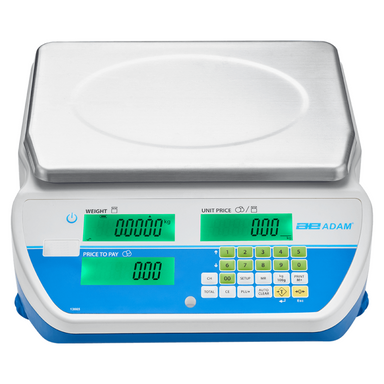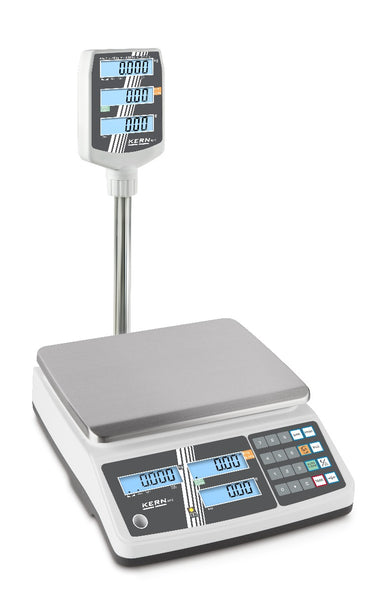
How to Use PLUs on Your Retail Scale
Owning or running a business isn’t easy, especially when you offer a variety of items that are priced based on weight. Luckily, our retail scales feature PLUs to make the process a whole lot smoother. This blog discusses what PLUs are, the benefits of using them, how to use PLUs, and which retail scales we recommend.
Understanding PLUs
What Are They?
PLU typically stands for Product Look-Up, but on retail scales, the more correct term is Price Look-Up. PLUs are a convenient way for any shop owner or employee to recall the piece weight and price of a stored item easily and accurately.
For example, let’s say you’ve determined that apples cost £0.33 per 100g, and a customer brings a dozen apples of various sizes to the counter. PLUs allow you to enter in a pre-set code to call up the unit price for apples in your scale. That way, you can weigh the twelve apples in bulk and the scale will automatically divide the weight by 100g and then multiply that result by £0.33. This will give you the price that the customer must pay.
What are the Benefits of PLUs?
Keeping Things Fair
Why not just set one price for apples, such as a pound each, and then multiply it by twelve? Well, then a person who buys twelve small apples will pay the same price as someone buying a dozen large apples. Generally, consumers consider this unfair, and would rather pay for exactly what they’ve got. Otherwise, less people will want to pay for small apples when they get more bang for their buck buying large.
You could, of course, make small apples 50p each and large apples one pound each. However, then you’ll be weighing them anyways, since you’ll have to prove that a consumer’s apple meets your definition of “small” or “large!” Checkweighing, anyone? Using PLUs takes the question of fair right off the table!

Streamlining Checkout Processes
Setting up PLUs in your retail scale will ultimately streamline your checkout processes. Instead of figuring out the price manually or having to remember the price for every product in your store, your retail scale will do all the work for you. This drastically reduces the amount of time spent on each transaction, so you can check out more customers in less time. Not only will your transactions be quicker, they’ll also be more accurate. The likelihood of errors is reduced when the scale calculates the price automatically, rather than when a human does it.
Enhancing Customer Service
Many retail scales have two displays, one in the front facing the owner, and one in the back facing the customer. Pricing transparency is an excellent quality for any business. Your customers will appreciate an exact, transparent, fast, and fair transactional process. This will keep them returning to your shop again and again.
How to Use PLUs on Your Retail Scale
It’s important to keep in mind that every retail scale is different. It’s difficult to provide exact directions for how to use PLUs on your specific scale. Time to dig out that manual! In general, however, all retail scales with PLUs share these same steps:
- Take the item that you want to store in your scale’s memory. For example, a watermelon.
- Decide what the price per kilogram or price per 100 grams will be for that item. Watermelons may be £0.42/kg.
- Decide what position, or PLU number, you want to assign to watermelons. If you choose 98, for example, each time you search for 98 in your scale’s memory, it will bring up the price per kilogram of watermelons.
- Save your decision.
- When a customer brings up a watermelon for purchase, select PLU and use the keypad to type 98.
- Weigh the watermelon on the scale. Let’s say the watermelon weighs ten kilograms. The scale will automatically multiply £0.42 by ten and display the price to pay: £4.20. All this without any calculations on your part!
Easy-peasy watermelon squeezy!

Recommended Retail Scales
Adam SWZ ‘Swift’ Price Computing Retail Scale

Capacity: 1.5/3kg – 15/30kg
Readability: 0.5/1g – 5/10g
The Adam SWZ ‘Swift’ Price Computing Retail Scale offers 161 PLUs for fast and easy price recall. Featuring a rechargeable battery, the SWZ is highly portable so you can bring it where the weighing is, such as a market stall. Three displays on the front and rear allow both you and the customer to see the weight, unit price and price to pay, allowing for transparent interaction. Take advantage of the RS-232 interface to connect to computers and/or a printer, for a convenient way to track sales or print receipts.
Kern RPB Price Computing Scale

Capacity: 3/6kg – 15/30kg
Readability: 1/2g – 5/10g
Perfect for small businesses or those with only a few items priced by weight, the Kern RPB Price Computing Scale features memory (PLU) for up to ten article prices. With three displays for total weight, unit price and total price, you’ll have all the information you need clearly laid out in front of you.
Need help selecting a retail scale, or have questions about how to use PLUs? We can help. Contact our Inscale team at 01908 972 660.

Leave a comment